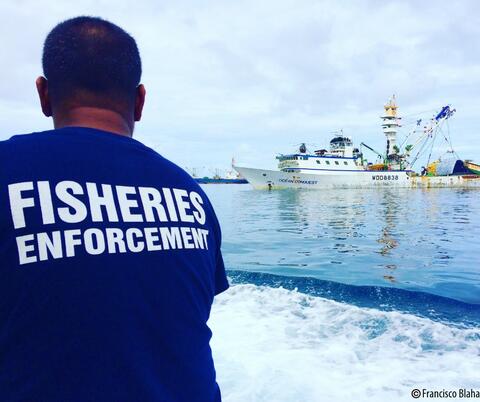Developing and enhancing capacity to protect Pacific fish stocks for the benefit of future generations
Illegal, Unreported and Unregulated (IUU) fishing poses a serious threat to the economic benefits provided by fisheries to our members, and to the fish stocks which can suffer from overexploitation. Unregulated fishing means that management plans to preserve the stocks are redundant; if people aren’t abiding by the rules then we cannot manage the fishery effectively. This is why having an effective monitoring, control and surveillance strategy in place is vital to protecting this resource.
Monitoring, control, surveillance and enforcement (MCS&E) is a term which covers a broad range of activities under fisheries management.
Offshore monitoring, control, surveillance and enforcement (MCS&E) is often given a higher priority than coastal fisheries and aquaculture MCS&E in terms of resources due to the significant financial gains from access fees and fines for infringements. Offences are often more straightforward to identify and address in terms of applying a penalty. Our oceanic fisheries team provides technical support and information sharing, but the regional MCS strategy is the mandate of the Fisheries Forum Agency (FFA).

Coastal fisheries and aquaculture
In the case of coastal fisheries and aquaculture, the fisheries officers are operating in quite a different arena which is not as clear cut as with the offshore sector. This lack of clarity, compounded with the short supply of MCS&E tools and infrastructure in some areas, means that there can be limited effectiveness for MCS&E in the coastal sector.
Pacific island coastal fisheries and aquaculture provide food and economic security to many communities across the region. We need to ensure that these resources are well managed and protected from overfishing so that they are sustainable for the future. Growing populations and climate change are increasing the pressure on these resources, and so it is vital that we work with our members to identify their specific needs for an effective MCS&E operation. A one-size fits all approach to coastal MCS&E clearly won’t work in a region which is home to a myriad of diverse cultures and seascapes.
Capacity building and awareness
In collaboration with Pacific partners*, we provide training to build capacity in the region through a range of workshops and courses. We can provide advice in terms of how to gather and record evidence of illegal activity so that the details are sufficient to support a prosecution where necessary. FAME has also developed an MCS&E database for coastal fisheries that enables our members to store details on inspections and investigations that can be used for future reporting and compliance planning. This is available to all our members and is adapted to suit each member’s specific requirements.
Regulating the fishing in coastal areas is an ongoing challenge, particularly when fisheries officers may find themselves dealing with infringements from members of their own communities and families. Ultimately, getting communities and the public to recognise and accept that infringements against fisheries regulations are crimes is key to improving MCS&E in this area. This includes increasing awareness about how small-scale individual or community level incidents can escalate to serve organised crime markets.
*New Zealand Ministry of Primary Industries (MPI) - Te Pātuitanga program, Fisheries Forum Agency (FFA), University of the South Pacific (USP) and the Australian Fisheries Management Authority (AFMA)
